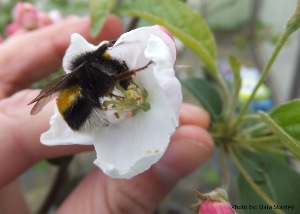First study showing pesticide exposure can affect crop pollination by bees
Release Date 18 November 2015

- Neonicotinoid pesticide exposure impairs crop pollination services provided by bumblebees
- Apple trees pollinated by bumblebee colonies exposed to pesticides produced 36% fewer seeds, showing a negative impact on pollination services to a crop of global economic importance
- Bumblebee colonies exposed to pesticides collected less pollen and visited apple flowers less frequently
For the first time an international team of researchers have shown neonicotinoid pesticides impair the pollination services provided by bumblebees.
Bees play a vital role in pollinating some of the most important food crops globally and have been declining in recent years. Until now research on pesticide effects has been limited to their impact on bees, rather than the pollination services they provide.
The study, published today in Nature, discovered that bumblebees exposed to a realistic level of neonicotinoid pesticides found in agricultural environments collected pollen from apple trees less often and visited flowers less frequently.
In addition, the researchers from Royal Holloway University of London, University of Reading and University of Guelph (Canada) discovered that trees pollinated by bumblebees exposed to pesticides produced apples with 36% fewer seeds - a factor closely associated with fruit quality in most apple varieties.
'Bees exposed to pesticides returned from apple flowers with less pollen than bees in the control group' -- Dr Mike Garratt, University of Reading
Lead author Dr Dara Stanley, Royal Holloway University of London, said: "We found effects of neonicotinoid pesticide exposure on crop pollination services provided by bumblebees at the colony level. To our knowledge this is the first study to examine the impacts of pesticides not just on bees themselves, but on the crucial pollination services they provide to crops and wild plants."
The team looked at three groups of bumblebees exposed to varying levels of neonicotinoid pesticides in artificial nectar for 13 days. Two groups were exposed to levels of pesticides realistically found in agriculture environments, and the control group was exposed to a sugar solution containing no pesticides.
Dr Mike Garratt, University of Reading said: "We found that bees exposed to pesticides returned from apple flowers with less pollen than bees in the control group. This suggests that bumblebees exposed to pesticides must somehow behave differently on flowers."
Professor Nigel Raine, University of Guelph, added: "Bumblebees are major pollinators of apples and many crops around the world. The findings of this study have important implications for both society and the economy, as insect pollination services to crops are worth at least $361 Billion worldwide every year, and are vital to the functioning of natural ecosystem.'
The Insect Pollinators Initiative is joint-funded by the Biotechnology and Biological Sciences Research Council (BBSRC), Defra, the Natural Environment Research Council (NERC), the Scottish Government and the Wellcome Trust. It is managed under the auspices of the Living with Environmental Change (LWEC) partnership.